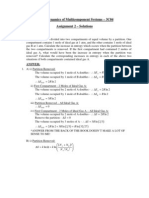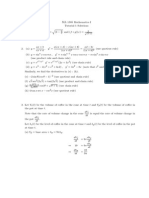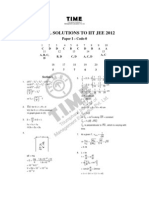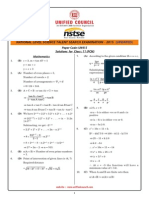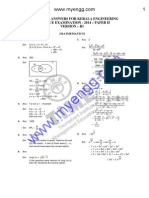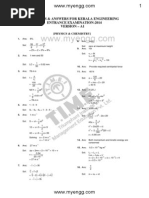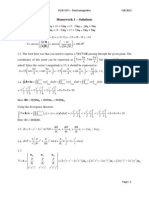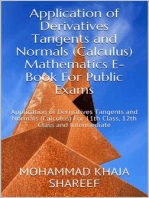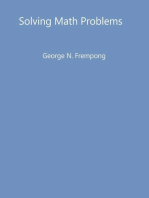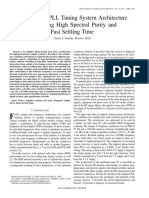Foundation Builder - Objective
Uploaded by
Somanshu MishraFoundation Builder - Objective
Uploaded by
Somanshu MishraFOUNDATION BUILDER (OBJECTIVE)
1.
6 4 3
3 2 1
Li ? He H + +
By law of conservation of mass and change the missing particle in neutron
( )
0 1
0
n
2.
M
e
ratio lies in the sequence l p n < < o <
Particle Change Mass
+2 +4
n 0 +1
p +1 +1
e 1
1
1837
=
( )
e
m
order n P e << <
3. Atomic Number =No. of protons in atom
By equation of change
1 56 1 x 2 + =
x =54
4. Same number of neutrons hence, Isotones.
5. Cathode Ray are made of electrons hence, same change/mass ratio as of | particle.
6. From Mulikens oil drop experiment, it was found that change on oil droplets is qualified.
Hence,
q =ne . where
19
e 1.6 10
= , n =1, 2, 3
(B)
7.
1
1
f f Hg
2
T
= =
8.
height wavelength
lowest freq
VIBGYOR
Energy freq.
(D) red
9. (c)
10. Wave number
1
u =
9
1
500 10
1000
2
10
500
(c)
11.
=
hc
E ,
1 2
2 1
E
2
E
= =
12. Frequency =
3
8
10 5090
10 3
wavelength
velocity
=
13. nh E =
h
E
n =
=
3 34
3
10 880 10 626 . 6
10
30
1.72 10 =
14.
( )
photon
0
12400 12400
E 1.393eV
8900 inA
= = =
19 14
1.393 1.6 10 x 3.15 10
=
5
3.15
x 10
1.393 1.6
=
5
x 1.41 10 =
( ) c
15.
out emitted absorbed
E
100
50
E =
emitted
2 1
absorbed
hc
n
100
50
n
hc
4500
5000
100
50
100
50
n
n
absorbed
emitted
1
2
=
=
5
0.55
9
= =
16. As PE =- 2 KE
PE will change from - 2x to
2x
4
= x
2
3
x 2
2
x
+ = +
17.
2
PE
T
E
= , so first excited state
18. 6 . 13
16
16 6 . 13
n
Z 6 . 13
TE
2
2
=
=
= and
2
PE
TE =
PE =- 27.2 eV
19. 511 . 1
9
1 6 . 13
n
Z 6 . 13
TE
2
2
=
=
=
PE
TE PE 3.02eV
2
= =
TE =KE KE 1.51eV =
20.
2
0
0.529n
r A
Z
=
0
3rd
0.529 9
r 2.3805A
2
= =
232 . 4
2
16 529 . 0
r
th 4
=
=
21.
Z
n 529 . 0
r
2
x
= , n =4
Z
n 529 . 0
r
2
H
= , n =1, z =1
0.529 16
0.529 Z 16
Z
< >
R
x
<r
H
22.
6
7
v 2.18 10
n
=
7
v
n
1 2
2 1
v n 5
v n 3
= =
(B)
23.
0
2
a 4
r R
Z
= =
0
3
a 9
r R
Z
= =
4
R 9
r
3
=
24. Ground state of hydrogen atom = 529 . 0
2 2
0.529 n 0.529 (n)
r 0.529
z 4
= = =
n 2 =
25.
n
Z 10 18 . 2
V
6
= , z v o ,
n
1
v o
26.
6
14 1
10
1
2.18 10
V
2
8.13 10 s
2 r 2 4 0.529 10
v = = =
t t
27.
nhC
E nhc = = u
10 =nhcx
hcx
10
n =
28.
2
2
n
Z 6 . 13
E =
= 4 . 3
4
1 6 . 13
=
29.
t
=
2
nh
mvr
Z
n 529 . 0
r
2
=
r mvr o
Angular momentum r o
30.
2
3
V Z
2 r n
v =
t
T
27
1
H
= = v
He
4
x
8
+
v = =
x
T
27
2
=
27
x T
2
=
=B
31.
2
2
13.6Z
TE eV
n
=
4,H
13.6
TE eV K E E
16
= = =
2
Li
13.6 9
TE x
1
+
= =
1 E
144 x
=
X =144 E
32.
h
R
2
2 2 h
1 2
1 1
1 R
n n
| |
=
|
\ .
2
12 12
1 2
1 1
2
n n
| |
|
\ .
12
2
1 1 1 1
1 4
1 25 1 n
| |
| |
=
| |
\ .
\ .
24
6
4
25
=
12
2
12
2
n 1
n
12 12
2 2
6n 25n 25 =
12
2
19n 25 =
12
2
25
n 1
15
= =
(b)
33.
2
2
r
KZe
f =
=
2 3
2 4
2
KZe Z
n
0.529n
Z
| |
|
\ .
2
Li
27
f f
16
+
= =
H
1
f x
1
= =
x
f
16
27
=
X =16f/27
34.
r
V
a
2
=
=
6 2 2
2
2
(2.18 10 ) Z
n
0.529n
Z
3
4
z
n
1,He
8
a
1
+
3
2,Be
64
a
16
+
3
2,Be
1
a
2
+
= ,
35. Follow the expression
Z
529 . 0 n
r
2
=
(d)
36. Follow the expression
2
2
n
Z 6 . 13
E
=
(a)
37. See theory
38. 2n
2
+3n
1
=18
2n
2
3n
1
=6
Solve this and we get
1 2
n 2, n 6 = =
So,
( )( ) 6 2 6 2 1
10
2
+
=
39. n
1
+n
2
=4
n
2
n
1
=2
2 1
n 3, n 1 = =
2
H 2 2
1 1 1
R 2
1 3
| |
u = =
|
\ .
= |
.
|
\
|
9
8
4 R
H
40.
|
|
.
|
\
|
=
2
2
2
1
2
H
n
1
n
1
Z R
1
2
H 2 2
1 2
c 1 1
cR Z
n n
| |
v = =
|
\ .
2 2
H H 2 2 2 2
c 1 1 2n 1
cR Z cR Z
n (n 1) n (n 1)
| | | | +
v = = =
| |
+ +
\ . \ .
When n >>>1 then (n +1) ~ n and (2n +1) ~ 2n
2
2 H
H 4 3
2cR Z n
2cR Z
n n
v = =
41.
2
2
min
1 1
3 R 0 R
3
| |
= =
|
\ .
min
1
R
=
42. |
.
|
\
|
=
2 2
2
H
max
2
1
1
1
) 2 ( R
1
|
.
|
\
|
=
4
1
1
1
4 R
1
H
max
max
H
1
3R
=
43. |
.
|
\
|
=
|
|
.
|
\
|
=
2 2 2
2
2
1
n
1
1
1
R
n
1
n
1
R
1
2
1
1 R
R
n
(
=
44. E =E
1
+E
2
2 1
hc hc hc
1 2
1 2
=
+
45.
|
|
.
|
\
|
=
2
2
2
1
2
H
n
1
n
1
Z R
1
|
.
|
\
|
=
2 2 H 9
7
1
n
1
R
10 2170
1
n 4 =
46. 15
2
) 1 n ( n
=
n =6
|
|
.
|
\
|
=
2
2
2
1
2
H
n
1
n
1
Z R
1
|
.
|
\
|
=
2 2
6
1
1
1
109677
1
= 3 . 937
47. 6
2
) 1 n ( n
=
n =4, so excited state is 3
rd
48.
49.
H 2 2 H
L
R
x
1 1
1
1
R
1
= |
.
|
\
|
|
.
|
\
|
=
2 2 H
B
3
1
2
1
4 R
1
9
5
x
1 1
B
=
50.
h
x m v
4
A A =
t
h
x p
4
A A =
t
p x A = A
2
3
1/
2
=1/ +1/
1 3
2
=
1 3 1 3
/ ( + )
t
= A
4
h
) p (
2
,
t
= A
4
h
p
t
= A
4
h
v m
t
= A
h
m 2
1
V
51. mass =100 10
3
kg
V =23.76 km s/hr = s / m
18
5
76 . 23
h =6. 6 10
34
34
39
3
h 6.626 10
10 m
5
mV
100 10 23.76
18
= =
52.
2
2
h
1 1 h
mv
KE mv m
h 2 2 m
v
m
| |
=
|
| |
= = |
|
\ . |
=
|
\ .
=
2
2
2 2
2
m
h
2
1
m
mh
2
1
m
1
KE o
53. = t n r 2
2 r
n
t
=
2
2 3 x
6 x
3
t
= = t
54.
1
m 200g
0.1
V 10
100 v 10ms
=
A =
`
=
)
t
= A A
4
h
V m x
34
h 6.626 10
x
200 0.1
4 m v
4 10
1000 100
A = =
t A
t
55. Follow theory
56. (Follow theory)
57. 10Hz 3.5 =
15
0
1.5 10 Hz =
h =6.6 10
34
KE =
0
h h
KE =6.6 10
34
(3.5 10
15
1.5 10
15
)
18
1.32 10 J
=
58. KE =
0
h h
|
|
.
|
\
|
=
0
2
1 1
hc mv
2
1
2
0
2hc 1 1
v
m
| |
=
|
\ .
0
2hc 1 1
v
m
| |
=
|
\ .
0
0
2hc
v
m
| |
=
|
\ .
59.
mv
h
=
A B
B A
v
v
When
A B
2 = , then V
A
=2V
B
2
mv
2
1
KE =
2
B
2
A
B
A
V
V
T
T
=
1
4
T
T
B
A
=
Also T
A
T
B
=1.50
T
B
= 0.50
T
A
=T
B
+1.5
=0.50 +1.50
=2
Also, 4.25 =W
A
+T
A
4.20 =W
B
+T
B
W
A
=4.25 2 =2.25
W
B
=4.20 0.50 =3.70
60.
A A
K E 2 =
B B
K E 4 =
A
A
h
2mK
= ,
B
B
h
2mK
=
h
2m
B
h
2
K 2m
=
A
K
B A
1 4
K K
=
A B
E 2 4E 16 =
A A
E 2 4E 2 16 = +
A
3E 12 =
A
E 4 =
B
E 4.5 =
61. See theory
62. Orbital angular momentum =
h h
( 1) 6
2 2
+ =
t t
l l
63.
mV
h
=
64. See theory
65. See theory
66.
t
+
2
h
) 1 l ( l
67. 68), 69), 70), 71), 72), 73), 74), 75), 76)
See theory
77. n =3, l =3, m =0, s =1/2
Not possible
78. Follow n +l rule
79. Follow theory
80. Follow n +l rule
81. A g subshell will have 9 orbitals so there will be 18 electrons
82.
83.
84. n =5
85. See the graphs
86. Follow n l l
87.
88.
32
2
2
3s
0
1 1
(6 6 )e
a 9 3
o
| |
+ = o + o
|
\ .
; where
0
2r.Z
r
3a
=
The maximum red all distance of node from nucleus will be
0
3( 3 3)
r a
2 Z
+
=
radial node occurs where probability of finding e
=0
0
2
= + or 0 = +
2
6 6 0 o + o = or
0
0
2rZ 33 3
3 3 r a
3a 2 z
+
o = = =
89. Probability of finding e
is zero implies mat 0
2
= + or 0 = +
0 ) 1 ( = o , 1 = o
0
a
r
2z
=
0 ) 12 8 (
2
= + o o
( 6) ( 2) 0 o o =
6 = o ,
0 0
6a 3a
r
2Z Z
= =
R =2,
0
a
r
Z
=
90. 26(Inh) follow electronic configuration
91. (D) is not possible because P sub shell cannot have more than 7 electrons.
92.
5 2
n
m 3d 4s = ml
0 2 2
T 3d 4s =
3 2
V 3d 4s =
2 1
Al 3s 3p =
93. ( ) n n 2 +
6 2
fe 3d 4s =
n =5
( ) 5 5 2 +
94.
1 5
s
2 2
= =
95. See configuration.
96. Same as 92
97. See Theory
98. ( ) n n 2 = +
( ) 2.83 n n 2 = +
99. Same as 98
100. ( ) n n 2 = +
( ) 1.73 n n 2 = +
N =1
101. ( ) n n 2 = +
Write the electric configuration for both fe and Co and after removal of 3 electron from cobalt the
unpaired in
3
fe 5
+
= and
3
Co 4
+
=
You might also like
- Applied Statistics and Probability For Engineers, 5th Edition75% (4)Applied Statistics and Probability For Engineers, 5th Edition23 pages
- Aieee Model Paper-1-Solutions Physics: 1 E=w+ mv 2 hc = w + E λ hc = w + 2E λ 2No ratings yetAieee Model Paper-1-Solutions Physics: 1 E=w+ mv 2 hc = w + E λ hc = w + 2E λ 212 pages
- Vibration and Control: Associate Professor Department of Mechanical Engineering Y.T.UNo ratings yetVibration and Control: Associate Professor Department of Mechanical Engineering Y.T.U82 pages
- Brilliant'S Progressive Test: Our One/Two-Year Postal Courses All India Engineering Entrance Examination, 2012No ratings yetBrilliant'S Progressive Test: Our One/Two-Year Postal Courses All India Engineering Entrance Examination, 201211 pages
- ISPRAVCI IZ KNJIGE "NAUKA O CVRSOCI 1 " - Brnić, TurkaljNo ratings yetISPRAVCI IZ KNJIGE "NAUKA O CVRSOCI 1 " - Brnić, Turkalj10 pages
- KEAM 2014 Physics Solutions For All Codes A1, A2, A3 & A4No ratings yetKEAM 2014 Physics Solutions For All Codes A1, A2, A3 & A416 pages
- Concept Recapitulation Test I/Advanced/PAPER-1/Answer/Answer100% (1)Concept Recapitulation Test I/Advanced/PAPER-1/Answer/Answer8 pages
- Solutions of Jee Main 2016 (Code H) : PhysicsNo ratings yetSolutions of Jee Main 2016 (Code H) : Physics11 pages
- MJC JC 2 H2 Maths 2011 Mid Year Exam Solutions Paper 2No ratings yetMJC JC 2 H2 Maths 2011 Mid Year Exam Solutions Paper 211 pages
- All Stream Narayana Jee-Main Gtm-8 Final Key & SolNo ratings yetAll Stream Narayana Jee-Main Gtm-8 Final Key & Sol13 pages
- JEE-MAIN 2013: Leader & Enthusiast CourseNo ratings yetJEE-MAIN 2013: Leader & Enthusiast Course4 pages
- List of Constants and Formulae: EUF Joint Entrance Examination For Postgraduate Courses in PhysicsNo ratings yetList of Constants and Formulae: EUF Joint Entrance Examination For Postgraduate Courses in Physics8 pages
- Resolução de Exercícios - Atkins Princípios de Química Cap. 1 (Par) PDFNo ratings yetResolução de Exercícios - Atkins Princípios de Química Cap. 1 (Par) PDF19 pages
- KEAM 2014 Mathematics Question Paper With Solutions100% (3)KEAM 2014 Mathematics Question Paper With Solutions12 pages
- KEAM 2014 Physics & Chemistry Question Paper With Solutions100% (2)KEAM 2014 Physics & Chemistry Question Paper With Solutions7 pages
- Vapor/Liquid Equilibrium: Vle by Modified Raoult'S LawNo ratings yetVapor/Liquid Equilibrium: Vle by Modified Raoult'S Law16 pages
- Physics 9HE-Modern Physics Sample Final Exam (100 Points Total)No ratings yetPhysics 9HE-Modern Physics Sample Final Exam (100 Points Total)13 pages
- Review: Three Dimensional Coordinate SystemNo ratings yetReview: Three Dimensional Coordinate System16 pages
- Trigonometric Ratios to Transformations (Trigonometry) Mathematics E-Book For Public ExamsFrom EverandTrigonometric Ratios to Transformations (Trigonometry) Mathematics E-Book For Public Exams5/5 (1)
- Application of Derivatives Tangents and Normals (Calculus) Mathematics E-Book For Public ExamsFrom EverandApplication of Derivatives Tangents and Normals (Calculus) Mathematics E-Book For Public Exams5/5 (1)
- Logical progression of twelve double binary tables of physical-mathematical elements correlated with scientific-philosophical as well as metaphysical key concepts evidencing the dually four-dimensional basic structure of the universeFrom EverandLogical progression of twelve double binary tables of physical-mathematical elements correlated with scientific-philosophical as well as metaphysical key concepts evidencing the dually four-dimensional basic structure of the universeNo ratings yet
- Analytic Geometry: Graphic Solutions Using Matlab LanguageFrom EverandAnalytic Geometry: Graphic Solutions Using Matlab LanguageNo ratings yet
- De Moiver's Theorem (Trigonometry) Mathematics Question BankFrom EverandDe Moiver's Theorem (Trigonometry) Mathematics Question BankNo ratings yet
- Khandelwal Mayank Nagesh: Academic DetailsNo ratings yetKhandelwal Mayank Nagesh: Academic Details1 page
- Lab 1 and 2 Somanshu Mishra 2015A8PS0427G Ans 1.1No ratings yetLab 1 and 2 Somanshu Mishra 2015A8PS0427G Ans 1.16 pages
- Diversity Within Species and Population GeneticsNo ratings yetDiversity Within Species and Population Genetics46 pages
- Y12 Enthalpy Change and Hess - S Law Questions MSNo ratings yetY12 Enthalpy Change and Hess - S Law Questions MS18 pages
- Factors Influencing GI Absorption of DrugNo ratings yetFactors Influencing GI Absorption of Drug11 pages
- QEL Q8 Series Gas Detectors: Key FeaturesNo ratings yetQEL Q8 Series Gas Detectors: Key Features2 pages
- Laser Amplifier: Spontaneous Emission AbsorptionNo ratings yetLaser Amplifier: Spontaneous Emission Absorption11 pages
- Hydrochloric Acid AND Miscellaneous Inorganic ChemicalsNo ratings yetHydrochloric Acid AND Miscellaneous Inorganic Chemicals9 pages
- Aqueous Solubility of Inorganic Compounds at Various TemperaturesNo ratings yetAqueous Solubility of Inorganic Compounds at Various Temperatures9 pages
- Seth Boriel - Lab - Enzyme Substrate ReactionNo ratings yetSeth Boriel - Lab - Enzyme Substrate Reaction4 pages
- Applied Statistics and Probability For Engineers, 5th EditionApplied Statistics and Probability For Engineers, 5th Edition
- Aieee Model Paper-1-Solutions Physics: 1 E=w+ mv 2 hc = w + E λ hc = w + 2E λ 2Aieee Model Paper-1-Solutions Physics: 1 E=w+ mv 2 hc = w + E λ hc = w + 2E λ 2
- Vibration and Control: Associate Professor Department of Mechanical Engineering Y.T.UVibration and Control: Associate Professor Department of Mechanical Engineering Y.T.U
- Brilliant'S Progressive Test: Our One/Two-Year Postal Courses All India Engineering Entrance Examination, 2012Brilliant'S Progressive Test: Our One/Two-Year Postal Courses All India Engineering Entrance Examination, 2012
- ISPRAVCI IZ KNJIGE "NAUKA O CVRSOCI 1 " - Brnić, TurkaljISPRAVCI IZ KNJIGE "NAUKA O CVRSOCI 1 " - Brnić, Turkalj
- KEAM 2014 Physics Solutions For All Codes A1, A2, A3 & A4KEAM 2014 Physics Solutions For All Codes A1, A2, A3 & A4
- Concept Recapitulation Test I/Advanced/PAPER-1/Answer/AnswerConcept Recapitulation Test I/Advanced/PAPER-1/Answer/Answer
- MJC JC 2 H2 Maths 2011 Mid Year Exam Solutions Paper 2MJC JC 2 H2 Maths 2011 Mid Year Exam Solutions Paper 2
- All Stream Narayana Jee-Main Gtm-8 Final Key & SolAll Stream Narayana Jee-Main Gtm-8 Final Key & Sol
- List of Constants and Formulae: EUF Joint Entrance Examination For Postgraduate Courses in PhysicsList of Constants and Formulae: EUF Joint Entrance Examination For Postgraduate Courses in Physics
- Resolução de Exercícios - Atkins Princípios de Química Cap. 1 (Par) PDFResolução de Exercícios - Atkins Princípios de Química Cap. 1 (Par) PDF
- KEAM 2014 Mathematics Question Paper With SolutionsKEAM 2014 Mathematics Question Paper With Solutions
- KEAM 2014 Physics & Chemistry Question Paper With SolutionsKEAM 2014 Physics & Chemistry Question Paper With Solutions
- Vapor/Liquid Equilibrium: Vle by Modified Raoult'S LawVapor/Liquid Equilibrium: Vle by Modified Raoult'S Law
- Physics 9HE-Modern Physics Sample Final Exam (100 Points Total)Physics 9HE-Modern Physics Sample Final Exam (100 Points Total)
- Trigonometric Ratios to Transformations (Trigonometry) Mathematics E-Book For Public ExamsFrom EverandTrigonometric Ratios to Transformations (Trigonometry) Mathematics E-Book For Public Exams
- Application of Derivatives Tangents and Normals (Calculus) Mathematics E-Book For Public ExamsFrom EverandApplication of Derivatives Tangents and Normals (Calculus) Mathematics E-Book For Public Exams
- Logical progression of twelve double binary tables of physical-mathematical elements correlated with scientific-philosophical as well as metaphysical key concepts evidencing the dually four-dimensional basic structure of the universeFrom EverandLogical progression of twelve double binary tables of physical-mathematical elements correlated with scientific-philosophical as well as metaphysical key concepts evidencing the dually four-dimensional basic structure of the universe
- Analytic Geometry: Graphic Solutions Using Matlab LanguageFrom EverandAnalytic Geometry: Graphic Solutions Using Matlab Language
- Shortcuts to College Calculus Refreshment KitFrom EverandShortcuts to College Calculus Refreshment Kit
- De Moiver's Theorem (Trigonometry) Mathematics Question BankFrom EverandDe Moiver's Theorem (Trigonometry) Mathematics Question Bank
- Hydrochloric Acid AND Miscellaneous Inorganic ChemicalsHydrochloric Acid AND Miscellaneous Inorganic Chemicals
- Aqueous Solubility of Inorganic Compounds at Various TemperaturesAqueous Solubility of Inorganic Compounds at Various Temperatures

